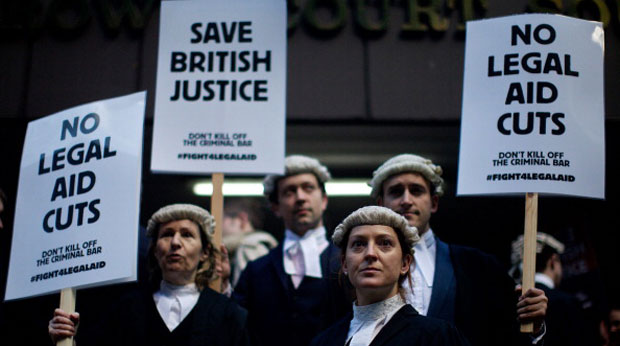Legal aid cuts: why lawyers are walking out
More criminals will walk free from court if legal aid fees are cut, claim protesting barristers

A free daily email with the biggest news stories of the day – and the best features from TheWeek.com
You are now subscribed
Your newsletter sign-up was successful
LAWYERS across England and Wales are staging a second mass walkout today in protest at government plans to cut legal aid fees. Criminal court cases, including the trial of Max Clifford and Nicky Jacobs, the man accused of killing PC Keith Blakelock, are expected to be disrupted as up to 3,000 barristers refuse to attend proceedings. Hundreds of lawyers will also march on Westminster in protest. It follows a similar walkout by barristers in January, the first of its kind in 400 years.
So why are they protesting?
Barristers want the government to rethink its plans to cut legal aid fees, which fund representation for members of the public unable to afford legal advice. They say the proposed rates are so low that talented lawyers will leave criminal defence work, leading to lower quality legal representation, miscarriages of justice and more criminals walking free from court. Lawyers are being careful not to describe today's action as a strike because it might raise questions about their contractual obligations.
The Week
Escape your echo chamber. Get the facts behind the news, plus analysis from multiple perspectives.

Sign up for The Week's Free Newsletters
From our morning news briefing to a weekly Good News Newsletter, get the best of The Week delivered directly to your inbox.
From our morning news briefing to a weekly Good News Newsletter, get the best of The Week delivered directly to your inbox.
How much does the government want to save?
Around £2bn is spent on legal aid each year, split between criminal defence and civil cases. The Ministry of Justice wants to cut the yearly budget by around £220m by 2018/19. The government proposals, to be phased in from April this year, include cutting fees in complex, high-cost cases by 30 per cent, and in other Crown Court work by up to 18 per cent. Barristers point out that legal aid fees have already been cut by 40 per cent for criminal cases since 1997 and legal aid underwent several radical changes last year. This included removing funding from many areas of work previously covered by legal aid, including divorce and custody battles.
Why are the cuts being made?
The Ministry of Justice says the savings are needed to ensure legal aid remains "sustainable". It has attempted to portray criminal lawyers as overpaid 'fat cats', pointing to figures that show 1,200 barristers working full-time on publicly-funded legal aid cases earned £100,000 each last year with six others picking up more than £500,000 each. A Ministry of Justice spokeswoman said: "At around £2bn a year we have one of the most expensive legal aid systems in the world, and it would remain very generous even after reform." However, barristers claim the highlighted figures are misleading. "Some barristers are earning as little as £13,000 a year. We are seeing more and more bankruptcies in the junior bar. Many are earning less than £25,000 a year," says Nigel Lithman, chairman of the Criminal Bar Association.
A free daily email with the biggest news stories of the day – and the best features from TheWeek.com
What is the impact on the public?
Lawyers might struggle to gain the sympathy of the public, says Clive Coleman, legal affairs correspondent for BBC News, but the dispute is about more than just pay. "When the state brings all of its powers to bear in prosecuting someone for a crime, it is critical that the defendant whose liberty, reputation and future is at stake, has access to good quality legal advice and representation," he says. Barristers warn that talented lawyers will simply not be prepared to do criminal legal aid work. Shadow justice secretary Sadiq Khan says this means that the government policies would essentially "restrict access to our courts to only those who can afford it".
Are court cases at risk?
Lawyers are aiming to bring the criminal justice system to a standstill today. Barristers will not attend proceedings at major crown courts in cities including London, Manchester, Birmingham and Liverpool. But the Criminal Bar Association warns that it is government putting trials at risk by implementing the cuts. For example, legal aid cuts caused a recent complex fraud trial to be put in jeopardy because 17 sets of chambers declined to accept the case for four of the eight defendants. Nigel Lithman, chairman of the CBA, told [1]The Guardian: “If these cuts are not addressed then the British justice system, which is held in such high esteem around the world, will cease to exist as we know it and the British public can no longer expect true justice to be delivered.”
-
 6 of the world’s most accessible destinations
6 of the world’s most accessible destinationsThe Week Recommends Experience all of Berlin, Singapore and Sydney
-
 How the FCC’s ‘equal time’ rule works
How the FCC’s ‘equal time’ rule worksIn the Spotlight The law is at the heart of the Colbert-CBS conflict
-
 What is the endgame in the DHS shutdown?
What is the endgame in the DHS shutdown?Today’s Big Question Democrats want to rein in ICE’s immigration crackdown